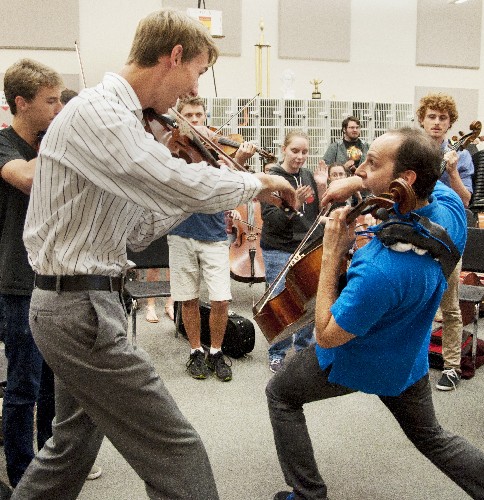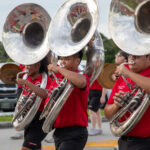
Cellist Mike Block is a master of improvisation. So when a student at a recent strings improv workshop at Vero Beach High School asked a potentially awkward question about his teeth, Block went straight for the laugh.
“When I was your age, I had braces,” he deadpanned. “Total waste. I lost all those perfect teeth.”
And that’s how the musical director of Yo-yo Ma’s Silk Road Project has faced all of his audiences – with humor. His once checkboard smile is perfect again, fixed last year after an accident five years ago knocked out nine of his teeth.
He was visiting Vero last month to build interest for his fifth international Mike Block String Camp scheduled for early July. For the first time, it will include an all-day music festival of folk, Celtic, jazz and Appalachian fiddle music.
It was just a month before his first visit to Vero in 2009, when he was hit by a New York taxi as he crossed the street. The impact broke his jaw and knocked out nine teeth, destroying the bone that held them.
His first question as he came to during surgery: ”Will I be able to sing?”
The answer is a resounding yes, as he demonstrated at the recent workshop, one of dozens he has held in Vero public schools.
“I was pretty banged up that trip,” he told the orchestra class. After extensive surgery, Block’s smile is perfect now, and he used it to great effect teaching “Happy,” the hit Pharrell Williams pop song that brought the workshop to its feet as soon as the kids recognized what it was they were playing.
In under half-an-hour, Block taught that song to multiple sections of the orchestra in a call-and-response session without anyone ever seeing a note of music on the page.
For many, it was a rare opportunity to get a taste of playing by ear, the first step in learning to improvise.
The high school orchestra teacher, Matt Stott, says Block’s workshops are an important supplement to his coursework. “I focus my curriculum on European classical music,” he says. “Mike introduces new styles of fiddle music from the U.S. and all over the world.”
Block has “greatly impacted” his advanced music students, particularly those intending to major in music in college, Stott says.
Not only is the ability to improvise essential in performing pop, folk, rock or blues music; it also is key to composition. And the brain’s workout may be as important as the fingers, with improvisation powering up a broad span of neural processing.
While scientists for years have been studying the effect of classical music on the learning and the developing brain, they are only recently beginning to study the neuroscience of improvisation.
It turns out that three areas of the brain show an overlap when it comes to making up a melody and creating a rhythm with which to play it. One part of the brain makes note of where the body is and where it needs to go next; another makes the musical decisions – sorting out the options on the fly, essentially. A third area of the brain is the same area that lights up for language, leading researchers to describe improv as learning a second language.
Other research has noted increased action in one area of the prefrontal cortex having to do with self-expression and autobiographical awareness, while another region normally involved in inhibition is deactivated during improvisation.
How that brain activity jibes with years and years of classical training is still a mystery. But great improvisers note that they rely on an unconscious ability that springs into action while playing.
Block never fails to offer a work of serious music by way of introduction to his classes.
He first came to Vero Beach at the invitation of Vero attorney Kathryn Johnston and her daughter Bridget, the one-time concertmaster of the Vero Beach High School orchestra, who had gone to one of Block’s string camps in Kansas City, MO.
The next year, he chose Vero as the site for the Mike Block String Camp, a summer camp for string improvisation – otherwise known as fiddling – that draws students from not only Indian River County but internationally as well.
The camp, which runs in two parts from June 30 through July 11, includes an all-day music festival of faculty and students July 5. That innovation is due to the length of last year’s faculty concert – it ran nearly four hours.
The camp’s faculty is an assemblage of top musicians from the fiddle spectrum. Instruments range from traditional string instruments like violin and cello to folk instruments like mandolin and banjo, as well as percussion and voice. Tuition is $550 per week, but scholarships are available.
“The way the camp works is you get to learn from the teachers then you get to form a band and you get to choose what you want to play, and you can choose how weird you want to get,” Block told his recent workshop students.
Anecdotal studies of teachers of stringed instruments note that many students improvise on their own time, either by changing the style of music they have memorized – giving Bach a rock rhythm for example, or experimenting with scales. Those who have played in alternative string ensembles tend to feel more confident experimenting on their own.
Stott says he has students who practice what Block has taught them throughout the school year.
“Students love the genres,” he says. “They find the creative process of making music more fun. The better these students get at the doors Mike has opened for them, the more passionately, expressively and effectively they perform classical music.”
Indeed, prior to the early 19th century, many classical performances included improvisation, in particular Mozart, Bach, Beethoven and Liszt.
Block himself grew up hearing plenty of classical music. His father was a conductor; his mother played French horn. He went on to study at Juilliard and was introduced to music from around the world. He now teaches at Berklee College of Music in Boston.
“I’m going to teach you the proper way to respond to bluegrass music,” Blocks tells the class. “Everybody say ‘woo!’“ he says, with a staccato bark. The class obediently barks back, and goes on to freely “woo” as warranted.
Block’s understated humor is punctuated with sound effects from his cello, which he plays standing up, the bulky instrument slung with a strap over his shoulder instead of held between his knees at a chair. The innovation allows him to move and sway like a rock guitarist.
“I feel more open and engaged,” Block says in answer to a student’s question. “I feel I can interact with the musicians better. I don’t think it’s as stylistically limiting.”
Last fall, Block became the first musician ever to play cello in Carnegie Hall standing up, in a performance the New York Times called “half dance, half dare” with Yo-yo Ma’s Silk Road Project.
As he put it to the workshop class last month, he performed while hovering over Yo-yo Ma “who was still sitting – and that was the greatest day in my life.”
For information about the camp, go to www.mikeblockstringcamp.com.






